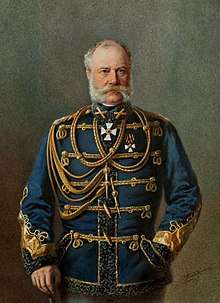Aleksandr Baryatinsky
Prince Aleksandr Ivanovich Baryatinsky (Russian: Алекса́ндр Ива́нович Баря́тинский, tr. Aleksándr Ivánovič Barjátinskij; 14 May [O.S. 2 May] 1815 – 9 March 1879 ) was a Russian General and Field Marshal (from 1859), Prince, governor of the Caucasus.
Aleksandr Ivanovich Baryatinskiy | |
|---|---|
 Baryatinsky in Russian Hussar uniform | |
| Born | 14 May [O.S. 2] 1815 Ivanovo, Kursk Governorate, Russian Empire |
| Died | 9 March 1879 (aged 63) Geneva, Switzerland |
| Allegiance | |
| Service/ | Imperial Russian Army |
| Years of service | 1833–1862 |
| Rank | Field Marshal |
| Battles/wars | Caucasian War Kraków Uprising Crimean War |
| Awards | Order of St. Andrew Order of St. George Order of St. Vladimir Order of Saint Anna |
Life
Baryatinsky entered the school of the ensigns of the Guard in his seventeenth year and, on 8 November 1833, received his commission of cornet in the Life Guards of the future Tsar Alexander II. In 1835, he served with great gallantry in the Caucasus, and on his return to St.Petersburg was rewarded with a golden sword for valour. On 1 January 1836, he was attached to the suite of Alexander, and in 1845 was again ordered off to the Caucasus and again most brilliantly distinguished himself, especially in the attack on Shamil's stronghold, for which he received the Order of St. George. In 1846, he assisted Field Marshal Ivan Paskevich to suppress the Kraków Uprising. From 1848 to 1856 he took a leading part in all the chief military events in the Caucasus, his most notable exploits being his victory at Mezeninsk in 1850 and his operations against Shamil in Chechnya.[1]
His energetic and at the same time systematic tactics inaugurated a new era of mountain warfare. On 6 January 1853, he was appointed adjutant general and, on 5 July of the same year, chief of staff. In 1854, he took part in the brilliant Kurbsk Dere campaign. On 1 January 1856, he became commander-in-chief of the Caucasian army, and, subsequently, governor of the Caucasus. As an administrator, he showed himself fully worthy of his high reputation. Within three years of his appointment, the whole of the eastern Caucasus was subdued and the long elusive Shamil was taken captive. Baryatinsky also conquered many of the tribes of the western Caucasus dwelling between the rivers of Laba and Belaya.[2]
By the early 1860s, his health had seriously deteriorated, and on 6 December 1862, he was relieved of his post at his own request. He spent the last days of his life abroad and died in Geneva, after forty-eight years of active service.[2]
Literature
| Wikimedia Commons has media related to Aleksandr Ivanovich Baryatinsky. |
- Alfred J. Rieber (Editor): The Politics of Autocracy. Letters of Alexander II to Prince A. I. Bariatinskii 1857 - 1864, Mouton & Co, Paris/The Hague 1966
References
- Chisholm 1911, pp. 455-456.
- Chisholm 1911, p. 456.

- A. L. Zisserman, Fieldmarshal Prince A. I. Baryatinski (Russ.) (Moscow, 1888–1891).